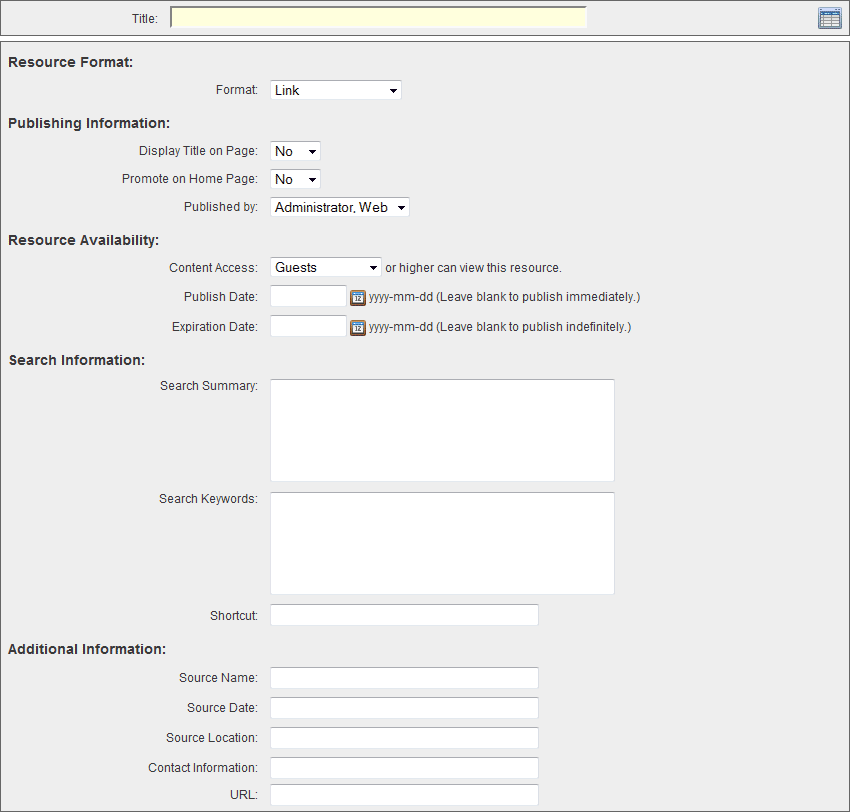Resources: Quick Links
Resources
The Resources manager allows you to create a searchable, cross referenced library of anything from people and skills to online newsletters to job openings and organization classifieds. With a little creativity, the value of the Resources manager is virtually unlimited.
Who has access:
You must have one of the checked permissions to use this manager.
Guest
Member
Contributor
Editor
Administrator
Resources Coordinator
Resources Manager: Overview

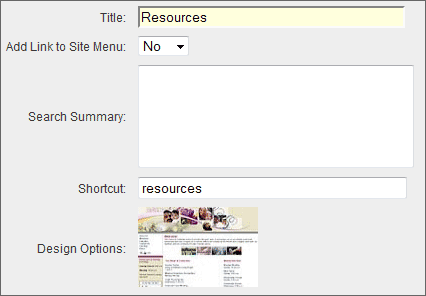
- TITLE: Enter a title for your Resources manager section. This title will appear on your main menu should you choose to display the link.
- ADD LINK TO SITE MENU: Select "Yes" from the drop down menu to display the link on your menu. Select "No" from the drop down menu to not display the link on your menu.
- SEARCH SUMMARY: Enter descriptive information to be used for Search Engine data and Site Search data.
- SHORTCUT: This allows you to make a shortcut to your Resources manager page. It will be a one word entry (i.e. resources). It can be accessed on the Web by typing in www.yourdomainname/shortcutname. (For example: www.yourdomain.com/resources).
- DESIGN OPTIONS: Click the design option that is currently shown. A window will appear with the other designs you made available in the Additional Designs section of the Designs manager. Select the design you want to apply to this page.
- Click the Save
 icon in the upper right corner of your screen to save your Resources manager settings.
icon in the upper right corner of your screen to save your Resources manager settings.
- Add/Edit page contents using the Page Editor. For help with the functionality of the Page Editor, see Using the Editor for more information.
- Click the Save
 icon in the upper right corner of your screen to save your Resources manager page settings.
icon in the upper right corner of your screen to save your Resources manager page settings.
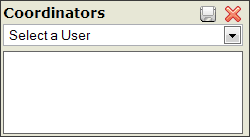 This allows you to select who you want to have access to the Resources manager.
This allows you to select who you want to have access to the Resources manager.- This feature is only applicable to those who have the People manager.
- Select an appropriate person from the drop down menu. The list of names that appear is populated from your People manager. The person must have an email address entered in your People manager in order to appear.
- Click the Save
 icon within the dialog box.
icon within the dialog box. - Repeat steps 2 and 3 for each Coordinator you want to add.
- To delete a Coordinator, click the Delete
 icon to the left of the person's name.
icon to the left of the person's name.
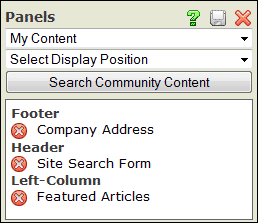 Add/Delete Panels
Add/Delete Panels
- Click the Panels tab.
- Using the first drop down menu, select the panel you wish to display.
- The panel you select will appear in the preview window at the bottom of the Panels dialog box.
- Using the second drop down menu, select the display position for the area you want the panel to appear on your site.
- Click the Save
 icon within the dialog box. Repeat this process for each panel you wish to add.
icon within the dialog box. Repeat this process for each panel you wish to add. - To delete a panel placement, click the Delete
 icon to the left of the panel title.
icon to the left of the panel title.
Update Panel Position and Order
- Click the Panel Name
- Using the first drop down menu, select the display position for the area you want the panel to appear on your site.
- Using the second drop down menu, select the order in which you want the panel to display. By selecting "1", the panel will appear first within its assigned position. By selecting "2", the panel will appear second within its assigned position.
- Click the Save
 icon within the dialog box. Repeat this process for each panel you wish to update.
icon within the dialog box. Repeat this process for each panel you wish to update.
Search Community Content
Please visit the section on the Community Content Portal for detailed information.
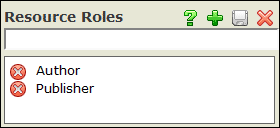 This allows you to set up different roles a user might have for a particular resource. For example: Author or Publisher.
This allows you to set up different roles a user might have for a particular resource. For example: Author or Publisher.- Type in the role in the text field.
- Click the Save
 icon within the dialog box.
icon within the dialog box. - The roles you create will later appear in a tab labeled "Related Users" once the resource is saved. This tab is explained below.
- To delete a resource, click the Delete
 icon to the left of the role you have created.
icon to the left of the role you have created.
Resource Format
This creates a heading on the viewing side for the resource to fall under. Select one of four heading choices from the Format drop down menu.
- LINK: Sets the title of the resource up as a link which takes the visitor to the URL entered in the Additional Information section of the resource options area.
- RESOURCE: Generic resource format, can be used for virtually any type of resource listing.
- TABLE OF CONTENTS: Sets the resource to display a list of related resources. See Parents below to learn how to relate resources.
Publishing Information
- DISPLAY TITLE ON PAGE: This will display the title of your resource at the top of the page on the Web when someone visits this page.
- PROMOTE ON HOME PAGE: Select "Yes" to automatically add a link to the current resource in the feature (Just For You) section of your home page.
- PUBLISHED BY: From the drop down menu, select the person who published this resource. These names are generated from your People manager records.
Resource Availability
This lets you indicate when you want your resource displayed and who you want to be able to see your resource.
- CONTENT ACCESS: This allows you to set the minimum security level required to view your page. For more information on setting access, see the People manager as this option will only appear to those who have the People Manager.
- Guest: This allows anyone who visits your site to view your resource.
- Member: This allows only those who have Site Member access or greater to view your resource.
- Contributor: This allows only those who have Site Contributor access or greater to view your resource.
- Editor: This allows only those who have Site Editor access or greater to view your resource.
- Administrator: This allows only those who have Site Administrator access to view your resource.
- PUBLISH DATE: Click the calendar icon to the right of the Publish Date field to bring up the interactive calendar and choose the date that your resource will be available to users. Leave the Publish Date field blank to make your resource available immediately. Alternatively, you may click inside the Publish Date field to bring up the interactive calendar.
- EXPIRATION DATE: Click the calendar icon to the right of the Expiration Date field to bring up the interactive calendar and choose the date that your resource will expire. The resource will appear through the end of the date you select. The end time is determined by your Time Zone selection within the Home Page Settings area. Leave the Expiration Date field blank to make your resource available immediately. Alternatively, you may click inside the Expiration Date field to bring up the interactive calendar.
Search Information
- SEARCH SUMMARY: Enter descriptive information to be used for Search Engine data and Site Search data.
- SEARCH KEYWORDS: Enter descriptive keywords to be used for Search Engine data and Site Search data.
- SHORTCUT: This allows you to make a shortcut to a specific resource. It will be a one word entry (i.e. myresource). It can be accessed on the Web by typing in www.yourdomainname/resources/shortcutname. (For example: www.yourdomain.com/resources/myresource). Note: You must create a shortcut in the Manager Settings section of the Resources manager in order for the shortcut to the specific resource to work!
Additional Information
- SOURCE NAME: If you have a source for where the resource came from, type its name here.
- SOURCE DATE: If you have a date for when the resource was published, type its publication date here.
- SOURCE LOCATION: If you have a location for where the resource came from, type the location where you got the source.
- CONTACT INFORMATION: If you have contact information for where the resource came from, type any contact information relative to the source.
- URL: If you have a URL for where the resource came from or where you want to direct viewers of the resource to, type its website address here.
- DESIGN OPTIONS: Click the design option that is currently shown. A window will appear with the other designs you have to choose from. Select the design you want to apply to this page.
- Add/Edit resource contents using the Page Editor. For help with the functionality of the Page Editor, see Using the Editor for more information.
- Click the Save
 icon in the upper right corner of your screen to save your settings.
icon in the upper right corner of your screen to save your settings.
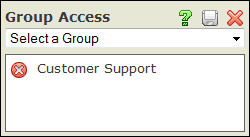 This allows you to make a resource viewable only by users in the selected group or groups. The user must be granted Member access or greater within the group to see the resource. For more information on setting access, see the People manager.
This allows you to make a resource viewable only by users in the selected group or groups. The user must be granted Member access or greater within the group to see the resource. For more information on setting access, see the People manager.Note: This tab only appears if you have the Community Builder.
- You must first setup your target groups in the Groups manager.
- Users must be assigned to the group to be included in the target groups. This can be done by the individual through setting his/her preferences at log in or by changing those preferences from your Web site's home page. You can also do this manually through the People manager.
- Choose the group you wish to grant access and click the Save
 icon in the upper right corner of the dialog box.
icon in the upper right corner of the dialog box. - To delete a group, click the Delete
 icon to the left of the group name.
icon to the left of the group name.
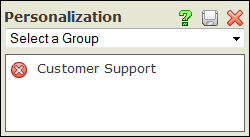 This allows you to limit promotion of this album's content on your Home page to specific groups. You must set Promote on Home Page to "Yes" to promote the album.
This allows you to limit promotion of this album's content on your Home page to specific groups. You must set Promote on Home Page to "Yes" to promote the album.- You must first setup your target groups in the Groups manager.
- Users must be assigned to the group to be included in the target groups. This can be done by the individual through setting his/her preferences at log in or by changing those preferences from your Web site's home page. You can also do this manually through the People manager.
- Choose the group you wish to grant access and click the Save
 icon in the upper right corner of the dialog box.
icon in the upper right corner of the dialog box. - To delete a group, click the Delete
 icon to the left of the group name.
icon to the left of the group name.
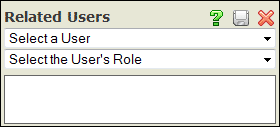 This allows you to associate your resource with a user and one of the roles you created earlier. This association will appear on the viewing side.
This allows you to associate your resource with a user and one of the roles you created earlier. This association will appear on the viewing side.- Select a user from the first drop down menu.
- Select a role that you previously created from the second drop down menu.
- Click the Save
 icon within the dialog box.
icon within the dialog box. - To delete a related user, click the Delete
 icon to the left of the user.
icon to the left of the user.
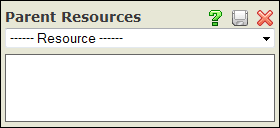 This allows you to "relate" one resource to another resource. In other words, if you relate one resource to another, it will appear underneath the "parent" resource.
This allows you to "relate" one resource to another resource. In other words, if you relate one resource to another, it will appear underneath the "parent" resource.- From within the resource, select the appropriate resource you want to make the "parent" from the drop down menu.
- Click the Save
 icon within the dialog box.
icon within the dialog box. - To delete a relationship, click the Delete
 icon to the left of the relation you want to delete.
icon to the left of the relation you want to delete.
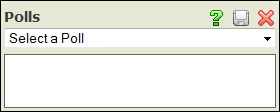 Using the drop down menu, select the poll you created in the Polls manager. The poll or polls you select here will only get applied to the page in which you are working.
Using the drop down menu, select the poll you created in the Polls manager. The poll or polls you select here will only get applied to the page in which you are working.- Click the Save
 icon within the dialog box.
icon within the dialog box. - Repeat this process if you have more than one poll.
- To delete a poll, click the Delete
 icon to the left of the poll title.
icon to the left of the poll title.
 Add/Delete Panels
Add/Delete Panels
- Click the Panels tab.
- Using the first drop down menu, select the panel you wish to display.
- The panel you select will appear in the preview window at the bottom of the Panels dialog box.
- Using the second drop down menu, select the display position for the area you want the panel to appear on your site.
- Click the Save
 icon within the dialog box. Repeat this process for each panel you wish to add.
icon within the dialog box. Repeat this process for each panel you wish to add. - To delete a panel placement, click the Delete
 icon to the left of the panel title.
icon to the left of the panel title.
Update Panel Position and Order
- Click the Panel Name
- Using the first drop down menu, select the display position for the area you want the panel to appear on your site.
- Using the second drop down menu, select the order in which you want the panel to display. By selecting "1", the panel will appear first within its assigned position. By selecting "2", the panel will appear second within its assigned position.
- Click the Save
 icon within the dialog box. Repeat this process for each panel you wish to update.
icon within the dialog box. Repeat this process for each panel you wish to update.
Search Community Content
Please visit the section on the Community Content Portal for detailed information.

- Delete a Resource or Resources by selecting the check box to the left of the Resource ID number.
- Click the Delete Selected
 icon. Once a Resource is deleted, there is not a way to retrieve the Resource.
icon. Once a Resource is deleted, there is not a way to retrieve the Resource. - Alternatively, you may click the Delete
 icon within the Resource itself.
icon within the Resource itself.
